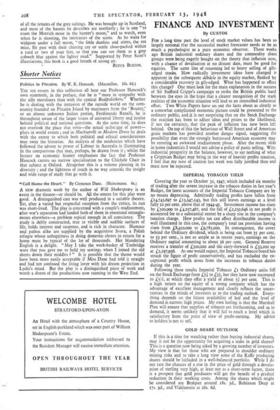FINANCE AND INVESTMENT
By CUSTOS
FOR a long time past the level of stock market values has been so largely notional that the successful market forecaster needs to be as much a psychologist as a pure economic observer. Three weeks ago British industrial ordinary shares and the commodity share groups were being eagerly bought on the theory that inflation now, with a chance of devaluation at no distant date, must be good for equities. The same line of reasoning led to heavy selling of gilt- edged stocks. How radically investment ideas have changed h apparent in the subsequent debdcle in the equity market, flanked by a considerable recovery in gilt-edged. What has happened to effect this change? One must look for the main explanation in the success of Si Stafford Cripps's campaign to strike the British public hard between the eyes in the hope that a clearer recognition of the stark realities of the economic situation will lead to an intensified industrial effort. Two White Papers have set out the facts about as clearly as a somewhat complicated economic picture could be presented to the ordinary public, and is not surprising that on the Stock Exchange the reaction has been to adjust ideas and prices to the likelihood, if not the certainty, that the peak of inflation has now been left behind. On top of this the behaviour of Wall Street and of American grain markets has provided another danger signal, suggesting the possibility that even the strongly buttressed American economy may be entering an awkward readjustment phase. After the recent slide in home industrials I would not advise a policy of panic selling. With industrial prosperity in the balance, however, to say nothing of what a Crippsian Budget may bring in the way of heavier profits taxation, I feel that my note of caution last week was fully justified then and must now be repeated.
IMPERIAL TOBACCO YIELD
Covering the year to October 31, 1947, which included six months of trading after the severe increase in the tobacco duties in last year's Budget, the latest accounts of the Imperial Tobacco Company are by no means depressing. Admittedly trading profits have fallen from £14,743,697 to £13,347,143, but this still leaves earnings at a level fully to per cent, above that of 1944-45. Investment income has risen by £500,000 to £4,257,467, and the fall of £2,232,646 in net profit is accounted for to a substantial extent by a sharp rise in the company's taxation charge. How profits tax can affect distributable income is well illustrated in this case, the company's total tax provision having risen from £8,45o,000 to £9,785,000. In consequence, the cover behind the Ordinary dividend, which is being cut from 35 per cent. to 33 per cent., is not so ample as in recent years, earnings on the Ordinary capital amounting to about 36 per cent. General Reserve receives a transfer of £5oo,000 and the carry-forward is £33,202 up at £2,297,936. As one would expect, the Imperial Tobacco board has struck the figure of profit conservatively, and has excluded the ex- ceptional profit which arose from the increases in tobacco duties during the year.
Following these results Imperial Tobacco Li Ordinary units fell on the Stock Exchange from £5i to £5+, but they have now recovered to £51-1, at which they offer a yield of about 51 per cent. This is
a high return on the equity of a strong company which has the advantage of excellent management and clearly reflects the uncer- tainties in the minds of investors as to the trading outlook. Every- thing depends on the future availability of leaf and the level of demand at current high prices. My own feeling is that the Marshall Plan will ensure that supplies of tobacco are forthcoming, and as to demand, it seems unlikely that it will fail to reach a level which is satisfactory from the point of view of profit-earning. My advice to holders is not to sell.
GOLD SHARE OUTLOOK If this is a time for watching rather than buying industrial shares, may it not be the opportunity for acquiring a stake in gold shares? This is a question now being asked by a growing number of investors. My view is that for those who are prepared to shoulder ordinary mining risks and to take a long view some of the Kaffir producing shares should be ialuded in a well-balanced portfolio. While I do not rate the chances of a rise in the price of gold through a devalu- ation of sterling very high, at least not as a short-term--factor, there is a prospect that gold producers will get the benefit of a gradual reduction in their working costs. Among the shares which might be considered are Brakpan around Ifis. 3d., Robinson Deep at 17s. 9d., and Vlakfontein at 265. 6d.


































 Previous page
Previous page